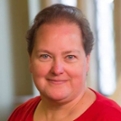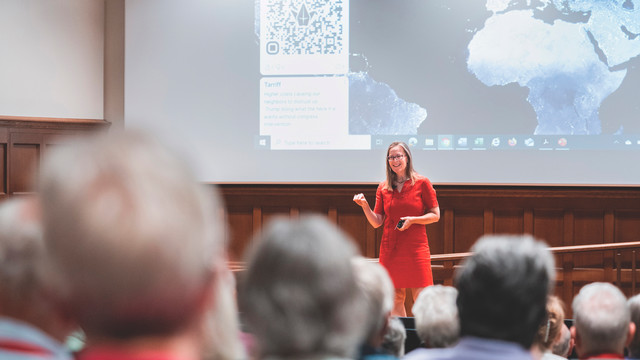Lifelong learners, passionate teachers
When business professor Maia Linask attended an Osher Lifelong Learning Institute event in 2012, she didn’t expect to become an instructor in the program. But after a conversation with the director, she agreed to teach a course on tariffs — one of her areas of expertise.
“The whole Osher program seemed valuable, and it was a nice way to share some of my knowledge with more people,” Linask said.
The Osher Lifelong Learning Institute recently celebrated its 20th anniversary at the University of Richmond and continues to attract instructors like Linask — and enthusiastic learners, too. While open to all, the program is geared toward adults 50 and older. Membership has grown from about 600 in the early years to about 1,500 members today. In 2024, Osher offered 375 classes.
With Osher, I get to have fun. I design classes around what fascinates me.

Instructors often come to Osher through recommendations. That was the case for political science professor Stephen Long, who had spoken to a handful of Rotary clubs and community groups. A few attendees suggested he teach an Osher class.
This summer, he taught Global Security Threats. “My subject is constantly changing, often at a very rapid pace,” Long said. “That’s part of what I love about teaching international politics. Of course, it also means that I need to constantly update my examples, think about how existing theories apply to new events, and reconsider what trends deserve the most attention in class.”
For Lynda Kachurek, head of Book Arts, Archives, and Rare Books at Boatwright Memorial Library, teaching Osher courses affords creative freedom. She’s led courses on archives and special collections but especially enjoys crafting topic-driven sessions.
“With Osher, I get to have fun,” she said. “I design classes around what fascinates me.” Her fall course Savoring the Past: Cookbooks as Cultural Artifacts draws on the library’s culinary collection, including a 1708 Spanish cookbook and a vintage Barbie cookbook. “It’s a wild, trippy experience,” said Kachurek, whose mother also authored a cookbook.
While all three instructors enjoy teaching undergraduates, Osher offers something different.
“Osher students have retained their love of learning but can put new ideas in context from their experiences and their longer sense of history,” Long said. “That makes them different from the undergraduates in interesting ways.”
Linask echoes this sentiment, highlighting the unique rewards for instructors.
“Teaching Osher is all the best parts of teaching — sharing ideas, great conversation, no grading,” she said. “The whole program is fabulous.”
